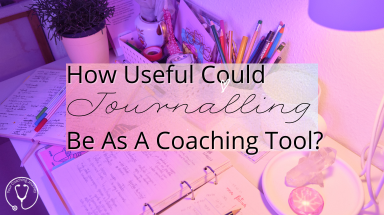Prefer to listen?
This blog post forms the basis of a podcast on our new coaching model, which you can listen to here.
Whilst journalling isn’t a tool that you would necessarily wish to use in the coaching room, it can still be a useful concept to introduce to your coachees. Well, Helen thinks so anyway. Tom isn’t entirely convinced, but has his own ideas around when journalling might be useful.
Taken from our podcast on this topic, let’s explore our thinking around how journalling could be useful in itself, and within the context of coaching.
What is Journalling?
There are a number of different ways to journal. It might be
- keeping a diary
- writing a daily line or affirmation
- a dream journal
- or even a notebook of plans or lists.
- to reflect on their day or their week or their month or even their year
- a gratitude journal,
- a line, a day journal
- longhand or bullet journalling (where you use lots of images and lists, bullet points, affirmations and stickers, and it’s very creative)
Thoughts From Helen
I’d like to share a form of journalling that I found useful (eventually, because she had a couple of false starts on this) and that I encourage my clients to try. When I was doing some personal development work at quite a difficult point in my life, I was introduced to this form of journalling. It comes from Julia Cameron’s book, The Artist’s Way, and she calls it ‘morning pages’. It’s a free flow of consciousness, in longhand until you fill three pages of A4 paper. The idea is, get up or even to stay in bed, first thing in the morning, grab a notebook and pen and write for three pages. And just write and write and write and write and write. It takes about 20 minutes when you get into the flow of it, so it’s not long, but it’s unedited thinking, getting all your stuff out of your head and onto paper. And it was really originally designed or put out there by Julia Cameron as a way to reconnect with the creative part of yourself. Now, I’ll be honest, I struggled with this because every day, first thing in the morning, I’m not really in a thinking space, but actually, that’s entirely the point.
On my third attempt, I managed to continue to do this for a few weeks, which was quite something for me whose never kept a diary longer than a couple of weeks. And what I found was that it really cleared my head in the morning. When I first started doing this, I was living on my own and I was working on my own, so I didn’t really have someone around to bounce ideas off. Morning pages would help me reorder my thoughts. Sometime it would help me create a massive to do list if that’s what was in my head, but also it helped me clarify my thinking. Quite often, I’d wake up and start writing and it would be ‘I had a really weird dream last night’. Most of my entries started like that, but then I might be pondering a question and by the end of my three pages, I’d have answered my own question. So I find it really interesting that it brings out some inner thoughts and helps you to reflect, that kind of thing.
This process can feel like a big task. But I would say, if you’re really struggling with it, just give it a go and see where you get, because it’s pushing past those stuck points when you think you’ve got nothing else to put on paper, and pushing to those three pages that actually bring about the revelations. A bit like when we’re coaching, if we were to say to someone, what options do you have here? And they said, I’ve got a and b, and we just carried on coaching around a and b. They wouldn’t get to the really great generative thinking. When we ask what else and what else, and what else could you do? In different ways, we get to really juicy stuff and that’s what happens with doing the three pages and pushing through.
I think whilst it was originally used to connect with that creative side of you, what I and many other people have discovered, is that it was a tool that can be useful in processing thinking and getting all of the whirling thoughts from your head onto paper. And suddenly you could then start the day a little clearer, or something that was bothering you, or just a dilemma would become either more clear or suddenly it didn’t matter so much because you’d got it out of your head and onto paper and got some perspective and clarity. For me, it allowed me to start my day fresh. I don’t do it now, I don’t feel the need to do it now, I have the opportunity to talk things through more, to have coaching when I need. However, if something is still on my mind, I do often sit down and just write about it. And if you just sit and write for 20 or 30 minutes, I think it’s really helpful to work through things and to get to a good place or even an action step.
And in many ways it’s similar to coaching in that you’re just getting those thoughts out and it’s like the paper is listening to you. I don’t think it’s the same as coaching at all, but there is that element to it that’s similar.
How does suggesting journalling to your coaches fit with the nondirective element of coaching?
It can be tricky when we’re aiming for a nondirective space. But I think it can be so helpful, because we know that so much thinking goes on outside of the coaching room between sessions and that magic that can happen in between sessions. We start the thinking process in the coaching space, but it doesn’t stop at the end of 60 minutes or 90 minutes. All of that is being processed when we leave the coaching room. So journalling in between times can allow the thinking to continue, can help the client capture those new thoughts and new ideas also can help them see how they’re changing through the process.
It also helps them track new things that they may then wish to bring back to coaching. I see it as another way to facilitate their journey. I do sometimes like to set a little bit of homework in between sessions for my clients. And that’s not me saying, I think you should do this about your problem, or I’ve got this journalling task, I want you to do it. I introduce it as a tool that can be useful for some people to help them process their thinking. For example;
“And Tom, as you leave the coaching session today, your thinking may well continue. Hopefully it will. And I’d like to introduce a tool that could help you to continue that thinking between sessions. And you might find it useful to bring back some of those thoughts to explore in our next session.”
I’ll explain how the journalling works and then leave it up to them if they want to work with it. And some clients jump on it and use it straight away, other clients don’t use it at all. And some clients text me three years later and say, ‘you know that thing you told me about journalling? I’ve just tried it, and you’re right, it works’
Everyone’s different. But as I say, I’m not telling them what to do about their problem. So I’m not problem solving, I’m offering them another avenue to process what’s going on in the coaching room. So for me, I think that’s okay. It’s just another useful tool that we’re introducing, into the coaching room that may be helpful to some, it may not to others.
I think going forward it also helps give them some self-efficacy, some autonomy in the future. It’s another way of thinking about their thinking if they’re not having coaching any longer or having a break from coaching or just want to give something some thought, they can have a go at journalling because they know it’s useful for them.
What interaction would you have with your coachee when they return to the coaching room around their journalling?
I’d allow it to be their decision if they wanted to talk about something they’d journaled about. In fact, one of the things that I usually suggest is that they don’t actually read back their thoughts after they’re done. It’s just a process to get things out of their hands, but they may have a revelation or two that they want to bring back and chat through, which is fine. But I’d never ask them what they’d written.
Sometimes I will ask them if they’ve journaled, if they’ve tried it to see what came up for them. But oftentimes I’ll just check in with them and they might mention it and then we’ll be on to, ‘what would you like to talk about today?’
What Challenges Are There With Journalling In This Way?
I think one of the things that stops people journalling is that they think, ‘’ve got this really beautiful notebook and I don’t want to spoil it.’ I usually say go to the supermarket and get a cheap A4 notepad and just write and let it happen.
Sometimes people say, what if I run out of things to say? And now, I’ve got loads of people who, when they get stuck, or begin their writing, just write, ‘Helen told me to write, so I’ve got to write. Write, write, write’
And that’s what they write for about 30 seconds, even I’ve written that to get me started, and then the words flow.
Another challenge can be the amount of writing, and I think just writing something is better than writing nothing for some people, if they’ve got a lot on. But three sides of A4 is actually only about 20 minutes of writing for me – sometimes less.
Likewise, it doesn’t have to be in the morning, if you want to work through some thoughts, just journal. But, what I found is that, much like meditation, there’s something about journalling like this in the morning that clears your mind in a way that allows you to deal with the other 23.5 hours in the day, and that is powerful. Rather than just getting up and going headlong into your day, having some time to get your thoughts out can allow you to start it off in a more considered way.
What About Technology?
This has always been suggested as a pen and paper exercise. I do know some people that will sit on a laptop and type out their thoughts, but as I understand it, when we write with pen and paper, we connect with a different part of our brain as opposed to typing. And I think that it can access more of that creative side. But, again, if pen and paper isn’t working and you want to type it out, then that might be better than doing nothing.
Thoughts From Tom
I think my relationship with journalling is evidenced by the amount of notebooks I have with one or two pages filled in. I like a nice notebook, but I’m not too consistent, and I think that’s just part of my personality, that I’m good at starting things off and then my enthusiasm tails off. And that idea of writing three pages of a four in the morning is a little bit daunting.
I’d like to share something that’s not journalling in the sense of doing a daily journal and carrying on with that. Actually, it’s much more suited to my personality. It’s the work of James Pennebaker, who is an American social psychologist. His work over the last 40 years has been focused on the written or typed word. (He doesn’t mind, which you do.) He’s discovered through his research that people who’ve experienced trauma, who take to expressive writing and committing their thoughts to paper, can be positively influenced by that process. It’s quite a short term exercise, you don’t have to keep writing about your trauma for days on end, because that could be problematic. The idea is that you would just write for around 15 to 20 minutes a day over four days. Now, it doesn’t have to be consecutive four days, so you can have a gap in between, but something about that’s the optimal. There’s something about having written again and again about the experience for four days that can have a really transformational impact on the way that people think about the trauma.
It seems that there is some relief for them to get it down on paper and out of their heads. And perhaps because they’re revisiting it and thinking about it again differently the next time they come to it, it allows them to get all of it out there and perhaps things might come to mind that they’ve not thought about before. I’ve done it myself with stuff that’s bothered me and something that was having an impact on me in terms of negative thinking and things like that. It was troubling me. I wrote about it on four separate occasions of writing. I think that I missed a day, but then returned to it and was able to carry on writing. And it has changed the way I engage with that experience. It’s had a very real impact. It’s not so troubling anymore because I’ve managed to get everything out there and really explore how I think about it and how I had been thinking about it in an unhelpful way.
Obviously, we’re straying into the realms of therapy, but James Pennebaker offers this out as an exercise for anyone to do. Not people that are just engaged in therapy, but just as a way of people helping themselves to overcome difficult circumstances and to give fresh thought to them and get it down on paper. It’s very short term, and there’s no requirement to write so many pages. It’s just to continue writing again, that stream of consciousness for 15 to 20 minutes. So it has a limit. We don’t have to do an hour, we don’t have to do 2 hours, we just have to do it 15 to 20 minutes and make sure that we do it for four days.
This is research based over a long period of time and it was demonstrated that it does have a positive impact. And, from personal experience, when I’ve done it, it has worked.
There’s an extra element to journalling that sits outside of the coaching room in that you don’t have to say it out loud to anyone else. It’s just for yourself. So you can just type it out and just delete it and no one’s ever going to see it. This means that you can actually really express what you feel about, and no one’s going to sit in judgement of you. Even though we know the coaching room is a very non judgmental place and we reassure our clients that we are being non judgmental, I think everyone that comes into the coaching room is going to have a slight filter of what they can say out loud to the coach for fear of being judged. I think expressive writing, which is what James Pennebaker called his exercise, has that guarantee that no one else is going to sit in judgement of what you’ve written. If you were writing it, you could just burn it. If you’re typing it, you can just delete it. It has that sense of extra privacy.
Journalling in some form may be something that you want to try for yourself, or introduce to your clients as a tool in the way described here. If you give it a go, do let us know how you get on with it and whether it is helpful.
To find out more about our Doctors’ Transformational Coaching Diploma click through here



